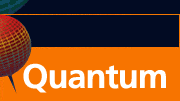 |

Quantum Cryptography
Quantum Computing
Quantum computation (QC) holds out tremendous promise for efficiently
solving some of the most difficult problems in computational science,
such as integer factorization, discrete logarithms, and quantum modeling
that are intractable on any present or future conventional computer.
New concepts for QC implementations, algorithms, and advances in the
theoretical understanding of the physics requirements for QC appear
almost weekly in the scientific literature.
This rapidly evolving field is one of the most active research areas
of modern science, attracting substantial funding that supports research
groups at internationally leading academic institutions, National Laboratories
and major industrial research centers. Well-organized programs are
underway in the United States, the European Union and its member nations,
Australia, and in other major industrial nations. Start-up quantum
information companies are already in operation. A diverse range of
experimental approaches from a variety of scientific disciplines are
pursuing different routes to meet the fundamental quantum mechanical
challenges involved. Yet experimental achievements in QC, although
of unprecedented complexity in basic quantum physics, are only at the
proof-of-principle stage in terms of their abilities to perform QC
tasks. It will be necessary to develop significantly more complex quantum-information
processing (QIP) capabilities before quantum computer science issues
can begin to be experimentally studied.
To realize this potential will require the engineering and control
of quantummechanical systems on a scale far beyond anything yet achieved
in any physics laboratory. This required control runs counter to the
tendency of the essential quantum properties of quantum systems to
degrade with time ("decoherence"). Yet, it is known that
it should be possible to reach the "quantum computer science test-bed
regime" — if challenging requirements for the precision
of elementary quantum operations and physical scalability can be met.
Although a considerable gap exists between these requirements and any
of the experimental implementations today, this gap continues to close.
Global Race
Quantum computing is a global race to conceive and
create the ultimate computing machine. If fully-functional quantum
computers can be built, and there is still a question that
they can, they will be able to rapidly factor extremely large numbers,
making them extremely useful for solving certain large mathematical
problems at speeds faster than today's fastest supercomputers and for cracking
secret codes that have been encrypted
by traditional methods. A functional quantum computer would put much
of the world's past and present encrypted information at risk of
being quickly deciphered.
Los Alamos researchers were among the first to make tangible advances
in quantum computation. In 1998, Los Alamos scientists used nuclear
magnetic resonance techniques to create a prototype liquid-based quantum
computer within trichloroethylene molecules. They went on to build
a slightly larger device in 2000, but the technology is far from the
desired end state.
More recent research efforts have focused on constructing a quantum
computer as a solid-state device. This will require the ability to manipulate
individual atoms in some kind of a solid matrix or lattice and Los Alamos
researchers are exploring this technology in collaboration with researchers
from the University of New South Wales in Sydney, Australia, California
Institute of Technology, and the University of Maryland.
|

National Security
. . . the development of a fully
operational quantum computer would demolish the concept of
national security. Whichever country gets there first will have
the ability to eavesdrop on the plans of its enemies. Although
still in its infancy, quantum computing presents a potential
threat to global security.
—Simon Singh,
The Code Book
Related Reading

- Los Alamos researchers on a scheme for efficient quantum
computation with linear optics
- Quantum Computation (QC) Roadmap
|